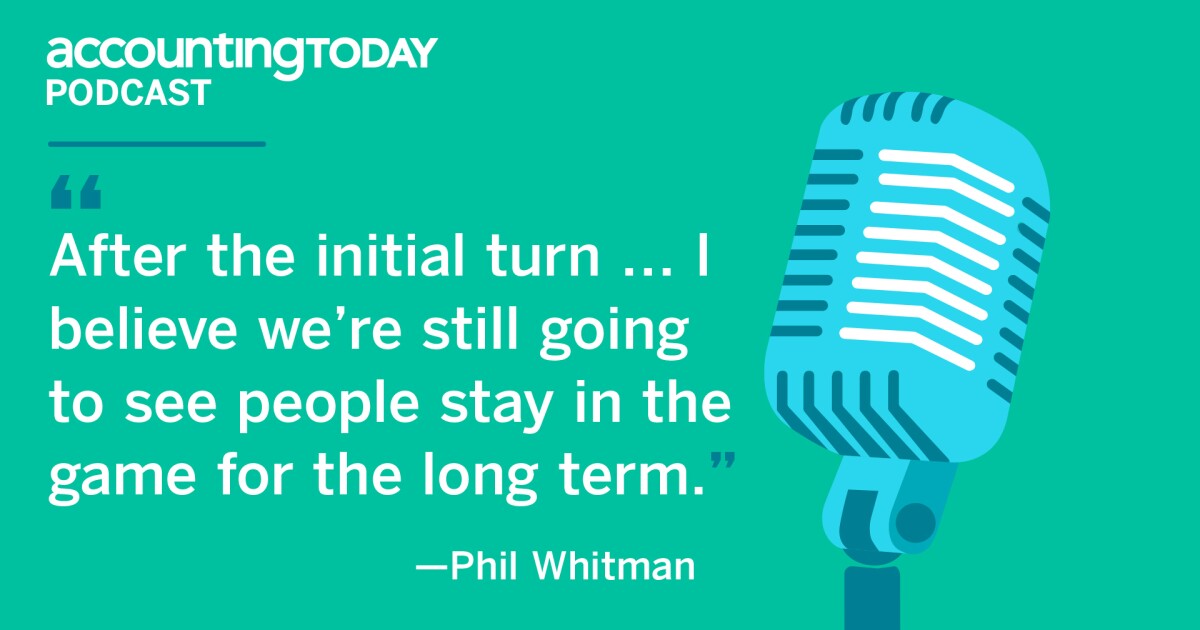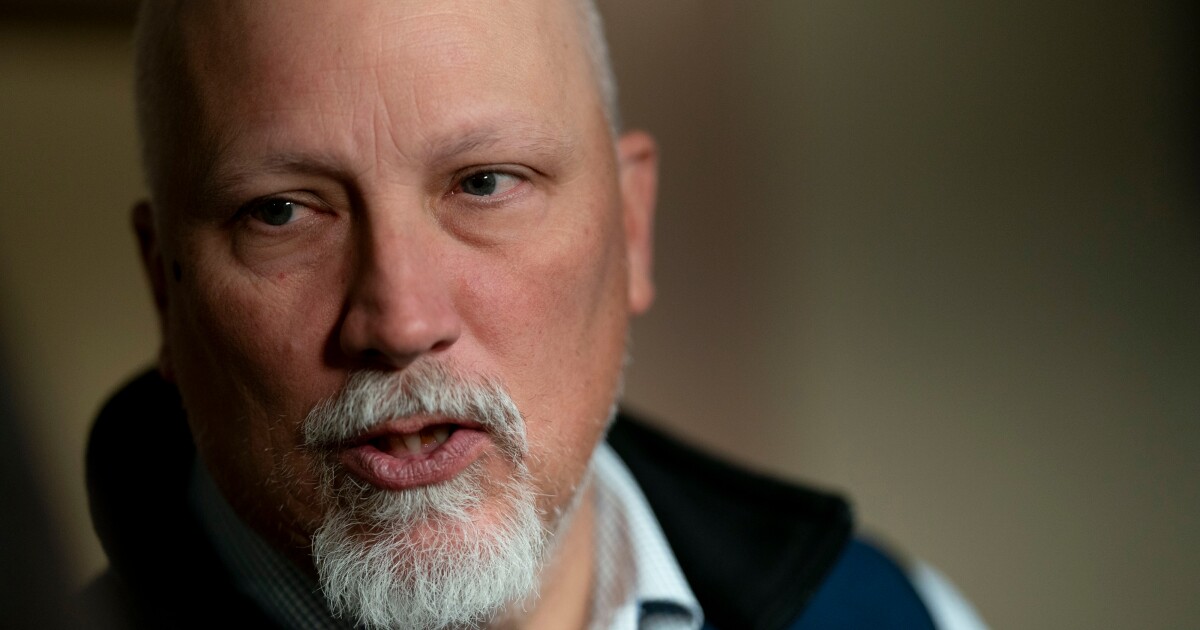Accounting
The problems PE solves | Accounting Today
Published
6 months agoon


Private equity can solve many of a firm’s problems — but not necessarily all, according to Phil Whitman of Whitman Transition Advisors, and there are alternatives.
Transcription:
Transcripts are generated using a combination of speech recognition software and human transcribers, and may contain errors. Please check the corresponding audio for the authoritative record.
Dan Hood (00:04):
Welcome to On the Air With Accounting. Today, I’m editor-in-chief Dan Hood. Private equity is one of the hottest topics in accounting these days, and we’ve been exploring it over the past few episodes, and we wanted to complete our investigation of the topic by bringing in Phil Whitman, he’s the president and CEO of Whitman Transition Advisors. He’s been involved in lots of these deals and in introducing lots of accounting firms to the world of PE and vice versa. Phil, thanks for joining us.
Phil Whitman (00:26):
Thank you so much. Dan.
Dan Hood (00:27):
I should also mention you’re also the co-chair of our PE summit, which is happening November 20th and 21st in Chicago. And these episodes, and this is the last of these, are sort of meant to tee that event up because it’s pretty exciting stuff. We’re bringing a bunch of people together in Chicago to dive into all the topics we’re going to be talking to today, but in greater depth and in person. So we think that’s going to be pretty exciting. We’re looking forward to that. But for now, I want to dive right in. When you think about PE and accounting firms looking at pe, what sort of problems are they looking to solve when accounting firms look to partner up with private equity firms?
Phil Whitman (01:05):
So Dan, I think it’s a number of things. Obviously, probably the single largest challenge that most firms are facing is talent. And that’s certainly a big one. And I believe in our industry, if you were to ask a CPA firm that is struggling to hire people, they would say, we’ve tried everything. But you and I both know when someone says we’ve tried everything, that’s certainly usually isn’t the case. And we know this because some of these private equity groups, they’ve brought on a full-time recruiting team of staff. Obviously there’s private equity groups out there. I believe today many of them are aspirational. I think of the ones that I know of, there’s probably 25 PE groups that actually have a foundational firm. That number could be a little bit more, but at least the ones that I am aware of, and some of them are at the beginning of the beginning, they don’t have the back office, they don’t have the ability day one to solve the recruiting challenge, but there’s that promise that they are going to be building that back office.
(02:23)
And sometimes a CPA firm can get a first mover premium because I could go with P Group A, let’s say like an Ascend or a Crete who have built out that back office and have recruiters recruiting. And they can probably tell you that over the course of the year, they’ve hired a hundred plus CPAs for the firms that are under their umbrellas. And those are probably the same firms that said, oh, we’ve tried everything and we don’t have the ability to hire yet. You have a group that’s now focusing on this 24 7. It’s not a partner’s individual, partner’s obligation to spearhead HR for the firm and spearhead that recruiting. Or even a firm that has a full fledged recruiting department. I mean, even they have jounce. So I think talent is a big one. The second thing I think that they’re solving for is succession and look private equity.
(03:32):
We’ve done transactions with firms where sometimes I scratch my head when I see a 72-year-old managing partner, no future partners in the ranks, three or four partners all in their sixties. And prior to private equity coming into this space, this was what we and every CPA firm would’ve considered an end of life firm. It would’ve been a firm for which maybe it would’ve been an orphan. They would’ve closed the lights and turned the key and there would be no buyer. Or we’ll give ’em 60 cents on the dollar a collections based deal. And lo and behold, private equity comes in and because they have great clients, because they have stable staff, even though there’s no future partners in the rank, private equity acquires this firm or 60% of the firm and tucks it into one of their bigger firms, and somehow they’re able to go out and find the young partners or senior managers that are going to step in and into the partner’s shoes. And we all know there are partners in CPA firms out there that still put numbers in boxes. They’re still preparing returns. And I think private equity does have a better way.
Dan Hood (04:49):
There you go. Well, let’s talk a little bit more about that way, and particularly I’m curious because I think a lot of accounting firms know their own troubles. They know their own problems, they understand hope, they understand their issues and their business, but they often don’t understand private equity. So what don’t accounting firms know about private equity deals that they should?
Phil Whitman (05:11):
I think there’s a perception of private equity that is not in all cases accurate. Pick your partner carefully. Okay. So what I would tell you is yes, every CPA knows that they’ve had a client that’s done a transaction with private equity and it was a disaster. And private equity is going to come in and they’re going to slash and they’re going to cut and they’re going to burn. And all they care about is ROI. And the reality is we are a people business. And there are RP groups out there that are looking at this as we’re a people business. This is different. We can’t come in and slash and burn. Yes, we do want to make a return. There are groups that have patient capital. They’re not in this for the three to five years, and we’re going to hit a grand slam and sell this to someone else.
(06:07):
And I think many PE groups are finding the attractiveness of public accounting is such that, Hey, we’re making so much money. We really, I mean in many cases they have to because there’s a life of a fund. But I’ve been hearing where some of these PE groups, they might just bring it in, a new investor group, have a continuation vehicle. And when you look at some of the models that are being built, I think after there is an initial turn, which means when PE sells all or a portion to another PE group, I believe we’re still going to see people that are going to stay in the game for the long term operators. I dunno, some people might call them the sponsors, but I think there’s a fallacy. I mean, I hear from managing partners all the time, well, what’s going to happen in five years when they sell?
(07:09):
And here’s my answer. They’re going to sell. And yes, there will be a new capital partner, but for your rank and file staff member and for your line partners the day after that sale, I mean, the partners might get an additional check, but the work is going to continue. The clients need to be served. It’s not like, okay, they’re selling us and okay, our business is done. I mean, this is just a change of now there’s a new partner sitting in a seat that someone else was, and I’m sure they’re going to include the CPA firm because they want it to be a successful transaction. So I think there’s a lot of fear around it. And you and I, years ago, we did that fearful mindset, and that still remains the same that everyone knows of the horror story of private equity. I would say we’re still very early stage, even though we’re three plus years into when Eisner Emper got in and Citron Cooperman.
(08:23):
But with some of these smaller platform groups that are rolling up firms, I’d say any firm that’s looking at private equity right now, I think we’re still at the tip of the iceberg. It’s the beginning of the beginning. And I think you need to be a believer. You need to, if you are a naysayer, and we get a lot of people that come to the table, they don’t believe that this is the right solution, but after they meet with some of the groups that we’ve introduced them to, they seem to have an aha moment that, wow, this really can work. And it’s firms that were vehemently opposed to doing anything but felt as managing partner, I need to know what’s going on. So I’m going to take these news to get educated. And then once they got educated, and by the way, there’s a big education that needs to be had. I mean, all of a sudden you’re getting a letter of intent with things like TEV and TTN and enterprise value and how do they calculate this and all their spreadsheets. But what I will tell you is from an educational perspective, firms owe it to themselves and their partners to at the very least, explore so that they have an awareness of the possibilities that are after.
Dan Hood (09:54):
Because as you say, it’s a PE in accounting thus far certainly has acted very differently than our traditional sort of stereotype of pe, right? It’s not asset stripping. It’s not coming in and getting rid of all the staff and loading it down with debt and then moving on. It’s not sort of the traditional, as you say, mustache twiddling stereotype of PE if they seem to understand the business. And also, I think more importantly, to understand the parts of accounting that they don’t. If I had a dollar for every PE firm I’ve spoken to that said, we don’t want to run an accounting firm. We don’t know how to run an accounting firm, we want you to run an accounting firm, I’d have a lot of dollars.
Phil Whitman (10:31):
Absolutely. And running the CPA firm. And so that’s the other thing. There’s a fear of losing control. And I will tell you, even if a CPA firm sells 60% and they’re sitting in the minority seat holding 40%, they’re running the show, they’re running the firm on a day-to-day basis. You know what? You want to go out, you want to borrow money, you want to merge in a firm, you want to do something, promote someone to partner. You got a 60% partner there that you got to share a compelling reason why we should be doing that. But what we have seen, even in the allocation of the rollover equity, and for those of you that don’t know, the rollover equity is that equity that if a private equity group buy 60% and the CPA firm is holding 40%, that is the amount that they are invested in that thing that they’re going to get the second bite, that second bite. And some of the private equity groups, what they’re saying is, we want you the managing partner, the older managing partner of the CPA firm to ensure that some of that rollover equity, and in many cases they’ll say X percent of the rollover equity needs to be put in the hands of the up and comers in the firm, which is a wonderful incentive for them to continue along with the ride.
Dan Hood (12:09):
Unless we paint two rows of a picture that you say that 60% partner, they’re also, I think the general impression is that they’re a partner who may be a little bit more, strict isn’t the right word, but they may be more likely to hold their partners accountable for their goals and that sort of thing. Accounting firms in general sort of have had a little bit of an issue with that ability to hold a partner group accountable in the sense of we set a bunch of plans and then if we don’t make it, well, we’re all partners, we’re all equal. It can be hard to make us all hit those numbers. Private equity firms are a little more likely, or in some cases a lot more likely to be like, no, no, these are the plans we agreed to. Why aren’t we hitting them? Right. That’s my impression is that they’re certainly going to be a little bit more strict in accountability or like I said, some cases maybe a lot more strict.
Phil Whitman (12:55):
Yeah. So what I would say is what I’ve seen in the transactions that have taken place thus far that we’ve been involved with, the goals that have been set for increases in EBITDA over a five year period have seemingly, to me been very reasonable. I’m working on a transaction right now where they’re saying, we want you to increase EBITDA 2% the first year, 5% the second year, and then 10% in each of the following three years. Those are the goals. And when I look at those goals and I look at additional service offerings that will most likely be added on, as well as, Hey, I’m now a partner, whether I’m the managing partner or the partner that’s in charge of hr, I just found 200 hours of time of the four or 500 that I’m spending on administration that I no longer have to spend, which means I have time to go out and develop business and service clients, wine and dine clients, and sell additional services to existing clients who should be our raving fans.
(14:16):
Anyway, so I see the goals that they’re setting as very, very achievable. But yes, private equity. At the end of the month, there’s going to be a board meeting and the managing partner, I think it was Charlie Weinstein that told me one of the differences, now he has someone that he has to answer to and he puts together data for board meetings and presents to his board. And in the past, I think it was partners in his firm and c-suite leaders that were putting stuff together for him to review. But so yeah. Is it a boss? Nah, it’s a partner. It’s just another partner sitting at the table. But Dan, you’re absolutely right. Accountability has been a very, very significant challenge for I would say 75 to 80% of the firms. You always have the, oh, that’s just Phil. Phil never gets his time in. Phil never gets his billing out. And after a while, firms become accepting of those behaviors. And it’s just sort of like that partnership model. Again, much more tolerant of that sort of stuff. I will say that as large firms like Citrin, Cooperman and Eisner, I think we’ve already seen it where non-productive partners and unnecessary administrative line people have been relieved of their jobs
Dan Hood (16:09):
And been invited to define success elsewhere.
Phil Whitman (16:12):
Exactly. And that might be an effort to further increase EBIT a as firms are getting ready for a sale.
Dan Hood (16:23):
Well, I mean that’s worth bringing up. As a point, the firms that are most attractive to private equity are going to be the firms that have already started moving in this direction anyways, right? They’ve already started cleaning themselves up and operating in a more corporate manner, a less of a collegial, hey, he said, Hey, that’s just Phil. He just does what he does, and that’s okay. They’ve already started the work of being more, like I said, sort of corporate is a shorthand for it, but it’s a tighter model and involves a little bit more accountability and a little bit more focus on the goals and alignment, universal alignment around those goals. So I think you put a good number on it in terms of how many platform firms are out there. I haven’t heard many more than that. And that’s got to involve maybe when you think of all their transactions together, maybe 150 firms total in terms of Tuck-ins and stuff like that haven’t got involved. That still leaves 43,800 or some other firms to look at, many of which may not be as attractive as that first wave of acquisitions.
Phil Whitman (17:26):
Exactly. And Dan, shortly after Eisner transacted, we were fortunate to tuck a firm, a very nice firm into Eisner er. And that’s where I first cut my teeth on what private equity looks like for a firm tucking into a large firm. And as I sat back, I said, you know what? This cannot only be for the largest of firms. And started talking to a lot of PE groups and CPA firms. And lo and behold, I mean, we’re working on a transaction right now. We’re a large private equity group. One of the large ones is having a conversation with a CPA firm that has one partner that’s doing a million dollars a year. He has a specialty that’s very interesting. But the reason I bring this up is it seems that there’s a place for everybody. These private equity groups, you can’t just lump them all into one basket because they come to the table with very different thesis or thesises, I’m not sure of that word.
(18:46):
Someone one day will tell me the right way to say that word. But they all have someone, small firms, some are long holders, some of them won’t start with a firm unless they’ve got five or $10 million of leave behind ebitda. For those of you that don’t know, leave behind EBITDA is the EBITDA that you and your firm are going to leave behind after you compensate your partners. And some of you might scratch your head and say, well, after we compensate our partners, there’s no leave behind ebitda. But the reality is they’re going to look at, if you make a million dollars a year, they’re probably going to say, well, you know what? We probably, if the person’s out there, we could go out and we can bring someone in at 350 or 400,000 to be a line partner and do what you do. The other 600,000 is a distribution of profits.
(19:49):
How much of that do you want to give up? And you might say, well, I need to make 500,000 to pay all my bills. So in that case, the leave buying EBITDA would be 500,000. And that’s what you’re going to get paid a multiple upon. So I mean, there’s a lot of education. Usually after firms go through two, three, sometimes four meetings or more, they sort of like, okay, I’m now expert. I understand the lingo, I understand all these acronyms. I understand what leave behind E, but there isn’t how we’re going to come up with an appropriate calculation.
Dan Hood (20:26):
It doesn’t, like you say, it’s a lot of education right to be done and you’re sort getting it on the fly as you’re sitting down to meet with a potential PE firm partner because it’s a very complicated and a very different approach to things I think than accounting firms have traditionally done. They’re used to a merger, an upward merger or an internal succession to be dealing with an entirely different industry with an entirely different set of acronyms and lingo. And that sort of stuff requires a fair amount of education, as you say.
Phil Whitman (20:55):
Yeah, absolutely. And to just give you a gist of how pervasive this doing a transaction with a private equity group has become last year in 2023 at Whitman Transition Advisors, probably 20% of the m and a transactions we did were with a strategic investor, like private equity could have been like a wealth management group, a family office. And 80% were traditional CPA firm to CPA firm transactions most with no money upfront. This year it’s flipped completely to the reverse where 80% of the transactions we’re doing are with strategic investors, private equity groups, and only 20% are just typical CPA firm to CPA firm. But the difference is in those CPA firm to CPA firm, usually now there’s cash upfront because in order to compete, they got to put cash upfront. And I truly believe, Dan, that with some of these top 100 firms, here’s what we’re going to see.
(22:15):
Managing partner I work with told me last week, Phil, I feel like my deal flow is drying up even you are showing me less because everyone’s talking about private equity. And this particular managing partner had a transaction he was working on and he was willing to put 3 million of cash upfront and he lost out to private equity. Private equity, put 10 billion of cash upfront. And the managing partner said to me, I think I need to explore because he sees the opportunities drying up and he can only get so much of an acquisition line of credit from this bank. And I think whether you are, and this is a firm that’s a hundred plus million in revenue, but whether you’re a hundred plus million in revenue or a $5 million firm that’s looking to tuck in smaller firms, everyone is going to be facing increasing competition from private equity and they’re coming to the table with a better succession solution for the baby boomer CPA firms, a big boomer managed owned CPA firms than there has ever been before. I’ve been saying, Dan, there’s never been a better time ever, ever, ever to be a CPA firm and the options available, and let me not say it’s not all private equity. There are firms we work with that still desire to remain independent, and they’re seeing a lot of opportunities coming from fallout from some of these private equity groups, like those people that are getting laid off.
Dan Hood (24:09):
Right. Well, I want to dive into that actually, it’s interesting because I want to dive into that. Next, I want to dive into the alternatives, maybe to private equity. The other options you may have, we do have to take a quick break real quick. Alright. And we’re back with Phil Whitman of Whitman Transition Advisors. We’re talking about PE and how it’s impacting the market, but you mentioned a couple of times you talked about family offices, you talked about wealth management firms, and then just before we went to the break, you were talking about the alternatives to private equity as a broad concept for firms that aren’t, for whatever reason, don’t end up going with a private equity firm. Maybe we can dive into that a little bit. What sort of alternatives are there other than taking on private equity?
Phil Whitman (24:53):
Sure. So obviously the first and most natural one is the do nothing, do nothing and just I’m going to continue to remain independent. I’m doing really well. I’m going to pick up the scraps that fall. I think doing nothing is for some firms, if they’re going to add advisory services, if they’re going to make themselves look more like a private equity backed firm, but it’s going to be very challenging to just sit there and do nothing because you can’t only grow organically. You need to be growing with some m and a, and that’s going to be very, very challenging. Alternatives to private equity though, we have clients that we’re working with in the wealth management arena, typically they’re looking for tax only practices, although we have some really, really large ones that have adopted an alternate practice structure. And we’ll bring on a firm that has 30% audit, 70% tax.
(25:56):
These are structured very differently. Some of them, they will pay a multiple of the eboc earnings. Before owner’s compensation, we did a transaction with a firm. They were a $10 million firm. They valued, they dropped 50% to the bottom line. They were valued at five times that 5 million. So that $10 million firm was valued at 25 million, and the wealth management firm bought 40%. So imagine this, they got 10 million of cash at closing, not paid out in the stream. Here’s $10 million. They still own 60% of their firm, and this wealth management group is now building a first class wealth management business for the firm. At the end of the day, depending on the exit, which might be an IPO, it’s a very, very large wealth management group. But in India, we’ve got wealth management, multiple wealth management groups. We’ve also seen family offices. We’re working with an organization that’s based out of India, and it’s backed by several Indian in family offices, billionaire family offices, everyone wants in this CPA for Marina, we’re working with a foreign pension fund.
(27:32):
We’re working with a family office that’s based out of Canada. That’s just been an absolutely, they’ve been in this professional service space, not the public accounting arena, but they’ve been very actively involved in rolling up wealth management firms. They’re in the wealth management business, but family office money is very significant. And there are multiple family offices. I don’t know if I mentioned it, but pension funds. Pension funds, there’s a couple of Canadian pension funds that we’ve had conversations with, and the newest one that we have, and I believe they’re going to be attending the wonderful event that Accounting Today is putting on in Chicago, that’s plug for all you out there to attend. It’s going to be a great conference, but it’s actually a bank holding company that said, we want to buy a CPA firm, and then from that platform continue to add onto it.
(28:47):
One of the things, Dan, I think there’s going to come a point in time, oh, before I come to that point in time also, we are going to see, my understanding is a very large tax only CPA firm is considering doing an IPO, and let’s not forget CBIZ. CBIZ is always an alternative. We saw Marcum transact with CBIZ, so I think we’ll see additional public companies coming into the space. But one of the points that I was going to make is there’s going to come a time when someone is going to be able to invest in an ETF that, in that ETF, it’s the CPA firm fund, and there’ll be 20 CPA firms that are publicly traded, and if someone wants a piece of the revenue, they’ll be able to invest in multiple CPA firms at the same time, years from now, maybe. Obviously we need to see a cascade of those going public, but I truly believe that’s going to happen. And there’s a reason. Think about it, even after paying partners, many firms, the scrape that’s available for private equity could be as high as 20% or more of the total revenues of the firm. CPA firms are very profitable businesses. I would venture to say that what the world does not know about is the many, many, many millionaires next door that the CPA firm profession has created.
Dan Hood (30:46):
Right, right. Well, they’re starting to realize it. As you say, all those alternatives to private equity, those are all people who look at this field and say, as you say, hugely profitable and potential for even more profit in half a dozen different strategic ways. You can get moving to advisory. You can get more streamlined in terms of how you deliver your cash services. They’re looking at a lot of different opportunities. But I love the picture of 10 years of buying an ETF for accounting firms. As you look out over the next five to 10 years, are there other big changes you see? I mean, obviously it sounds like you’re assuming PE will still be around and still be a player or,
Phil Whitman (31:23):
Yes, PE will absolutely be around what we think. So to date, our organization, we’ve met with almost 130 private equity groups and other strategic investors, and we track them and we track those that have transacted in the space. There are many, many that are aspirational and some of them that have actually transacted, they’re at the beginning of the beginning, and some of them are long holders, 10, 12, 15 years, some of these family offices. So I truly believe that private equity is here to stay. I think there are going to be winners and there will be some losers. There will be more winners than losers because I believe that every one of these private equity players that we’ve met with, we are dealing with brilliant young people that haven’t spent a lifetime entrenched in the CPA firm profession, and they bring the other ideas, other ways of doing it as well.
(32:36):
We haven’t touched on technology, but technology is changing faster than it ever has. And with artificial intelligence, I mean, there are dollars that firms are going to need to invest to compete, and I think private equity brings that capital stack five to 10 years, five years from now, still extremely, extremely robust. I mean, I would say in the next year to three years, we’ll see our first turns where, okay, are they going to be able to get a 12, a 15, ultimately a 20 x multiple? I believe it’s going to happen. I believe there’s some very large private equity groups out there that haven’t even dipped their toe in here because the check size that they want to write, they don’t have the ability to write that check. But once some of these players build these organizations into half a billion or a billion plus in revenues, they’re going to see new, larger billionaire private equity backed firms coming into the space. And then we’ll see five years from then, is there another turn? Is there a public offering? Does a pension fund buy the assets? Because clearly, I believe any pension fund would be thrilled if yet a guaranteed seven to 10% return on a portfolio for their beneficiaries. And I think that’s why we’re seeing some pension funds come in and it surprises me at the ground floor now instead of buying it for a much larger multiple five or seven years from now.
Dan Hood (34:37):
It’s exciting stuff, and this is an exciting conversation. I wish we had more time for it. Unfortunately, we’re just about out, but we’ll continue it in Chicago. As I said, I’ll give the final shameless plug, November 20th, 21st. Phil will be there at our PE summit so we can continue this conversation with him. But there’s also going to be a lot of other folks there, a lot of accounting firms, a lot of accounting firms, a lot of PE firms, a lot of deal makers, a lot of technical advisors, all the sorts of people you would want in a room to learn everything you ever wanted to know about private equity. And we’re afraid to ask, or I should say everything you want to know about private equity that you didn’t learn from this podcast because you covered a lot of ground, Phil, so I appreciate it. Phil Whitman of Whitman Transition Advisors, thanks again for joining us.
Phil Whitman (35:19):
Thank you, Dan. It’s absolute pleasure, and I’m looking forward to being side by side with you in Chicago, November.
Dan Hood (35:27):
It’s going to be great having all of you. Thank you for listening. We hope to see you help see you in Chicago. This episode of On the Air was produced by Accounting Today with audio production by Wen-Wyst Jean-Marie ready to review us on your favorite podcast platform and see the rest of our content on accounting today.com. Thanks again to our guest, and thank you for listening.
You may like
Accounting
Trump berates Republicans to ‘Stop talking,’ pass tax cuts
Published
1 day agoon
May 16, 2025

Al Drago/Bloomberg
President Donald Trump called on members of his party to unite behind his economic agenda in Congress, putting pressure on factions of lawmakers who are calling for last-minute changes to the legislation to drop their demands.
“We don’t need ‘GRANDSTANDERS’ in the Republican Party,” Trump said in a social media post on Friday. “STOP TALKING, AND GET IT DONE! It is time to fix the MESS that Biden and the Democrats gave us. Thank you for your attention to this matter!”
Trump sent the post from Air Force One after departing the Middle East as the House Budget Committee was meeting to approve the legislation, one of the final steps before the bill can move to the House floor for a vote.
House Speaker Mike Johnson has set a goal to pass the bill next week before the House recesses for its Memorial Day break.
However, the the bill
Narrow majorities in the House mean that a small group of Republicans can block the bill. Factions pushing for steeper Medicaid cuts and for an increase to the SALT write-off have both threatened to defeat the bill unless their demands are met.
“No one group gets to decide all this stuff in either direction,” Representative Chip Roy, an ultraconservative Texas Republican advocating for bigger spending cuts, said in a brief interview on Friday. “There are key issues that we think have this budget falling short.”
Trump’s social media muscle and calls to lawmakers have previously been crucial to advancing his priorities and come as competing constituencies have threatened to tank the measure.
But shortly after Trump’s Friday post, Roy and fellow hardliner Ralph Norman of South Carolina appeared unmoved — at least for the moment. Both men urged continued negotiations and significant changes to the bill that could in turn jeopardize support among moderates.
“I’m a hard no until we get this ironed out,” Norman said. “I think we can. We’ve made progress but it just takes time”
Accounting
97% say CPA firms not using tech efficiently says survey
Published
1 day agoon
May 16, 2025
While CPA firms far and wide have made major technology investments over the years, the vast majority of accountants say they’re not being used to their full potential.
This finding comes from a recent survey undertaken by
“We see employees make workarounds with tech stacks, which makes headaches that I think align with this 43%. We train people on new things, we ask them to use them, and they keep doing what they were doing before and only use the technology as much as they have to [in order to] move things along while you have people well trained on the software keeping up,” she said in a webcast on Thursday about the survey.

Ariege Misherghi—senior vice president and general manager of accounts payable, accounts receivable and the accountant channel—said the issue isn’t just because of firms but also vendors that don’t provide enough support, and may not necessarily understand the profession in the first place.
“Too often I think tools aren’t fully aligned with the workflows they’re meant to support. In SaaS they talk about product-market fit, but in this profession it’s not just that but also product-firm fit, and maybe product-profession fit. Not every tool marketed to accountants was built by people who truly understand how this profession works: the rhythms, the regulations, the stakes, the relationships, all of that. And even the greatest tools can fall short if they’re not implemented with a deep understanding of how firms really operate,” she said.
And sometimes the inefficiencies come from both sides at once: the survey found that only 37% of firms require clients to use their tech stack, something that Munson said “breaks my heart” as “it is so low.” A streamlined, established tech stack is needed to achieve true economies of scale, but to get there firms need to standardize their data, and to do that firms need to make sure their clients’ data is also standardized, which usually means integrated tech stacks.
“If you have all these different clients with all these different technologies, even if your own tech stack is standardized the systems they use is different, so the kind of data you will get will be different, and the work you need to do to make it work with your data is different, and your team spends a lot of time spinning their wheels,” she said. “Once you get standardized, where everything back and forth from clients is the same, you get to see how well the teams can do their work.”
One source of inefficiencies is a rushed implementation. Munson said that, too many times, firms are so eager to get a solution working that they don’t pay attention to all its capacities, just the ones they need right now, but once the basics are down firms still don’t circle back on the rest of the features and how they can be used to drive efficiency.
“Most of us have been through an implementation, either in the practice or with a client, where you’re just like ‘anything to get it working. Forget about all the fancy things it does. We just needed to do the basics right,’ and then we never circle back on those better, more efficient processes. We get to sort of minimal viable, and then we forget to come back and give it an extra polish. And so what we see there is the processes get written for that basic piece, and we never update,” she said.
But this is part of what both speakers believed was the larger problem of firms getting lost in the details of their tech stacks and not taking a broader, more holistic approach, which would enable more efficiencies. The key component to managing technology effectively, Munson said, is looking not at individual solutions here and there but thinking of the system as a whole.
“Often, what happens is something’s wrong or something is troublesome in some way. And so [we say] what can we do to fix that one thing? And we don’t think about it holistically and get all the right folks in there so that we’re solving for the right pain points,” she said.
Misherghi agreed, and added that this holistic extends not only to the technology a firm already has but the solutions they plan to purchase in the future. When evaluating what technology they need, she said leaders need to think not in terms of specific point solutions to particular problems but things that can support the entire workflow—plus, the onboarding, training and ongoing support from the vendor.
“Don’t just look for features, right? Look for solutions that support your workflows from providers that understand you. For firms, onboarding and training and optimization can’t be an afterthought. They’re essential to realizing value. I think this is where vendor partnerships matter. Firms seeking the strongest results aren’t just using software, they’re collaborating with their providers, they’re staying educated, they’re making sure their tools evolve alongside their needs. The best outcomes happen when your technology partner acts like part of your team, not just part of your toolkit,” she said.
Misherghi said that the more successful firms she’s seen think less in terms of performing particular tasks but designing an entire system that, through automation, can do those tasks for them. It is less about plugging holes and more about developing a full infrastructure. The survey found that 74% of participants have a detailed plan to add new services in the next 12 month; Misherghi noted that, among these firms, 86% have a detailed technology roadmap, which is “a wonderful mark on the evolution of the profession we’re seeing.”
She said a good tech roadmap is more like a service design blueprint versus a shopping list. Successful firms, she said, are not just chasing features but designing intentional workflows and systems capable of scalable service delivery. Similarly, she stressed that the provider should be more than just a vendor but a strategic co-architect that can help with growing pains.
Misherghi said this approach will become especially relevant as AI becomes more common, as integrations will be key to their effective use, which means thinking in terms of the whole system to understand where those integrations should take place. Right now, she said, people think of AI in terms of analyzing data or extracting fields, but with the rise of AI agents will require firms to focus more on coordinating between them.
“I think the next big leap is when those systems don’t just talk to each other, they act on each other’s behalf. I think the next big inflection point will be moving from automated steps to autonomous workflows, where AI agents aren’t just analyzing data or extracting fields but actually orchestrating tasks across tools based on firm policies and context and that will change the role of the accounting profession: its less time doing the work and more time designing the system for how everything works together. So the firms that will be thriving are those who are building strong infrastructure now because that is what AI needs to deliver on its core value,” she said.

A key House committee on Friday failed to advance House Republicans’ massive tax-and-spending bill after hard-line conservatives bucked President Donald Trump and blocked the bill over cost concerns.
The House Budget Committee rejected
It’s incredibly rare for bills to fail at this step in the process, with the committee vote typically serving as a rubber-stamp to the bill before it moves to the House floor.

Stefani Reynolds/Photographer: Stefani Reynolds/B
The setback could be temporary and the panel can still approve the bill once the GOP differences are resolved.
Republican Lloyd Smucker, who switched his vote to “no” to allow the committee to bring it up again, told reporters the committee will hold another vote on Monday.
Trump, whose social media muscle and calls to lawmakers have previously been crucial to advancing his priorities, inserted himself in the debate less than two hours before the vote, berating dissidents and urging them to fall into line.
“We don’t need ‘GRANDSTANDERS’ in the Republican Party,” Trump said in a social media post on Friday. “STOP TALKING, AND GET IT DONE! It is time to fix the MESS that Biden and the Democrats gave us. Thank you for your attention to this matter!”
The bill’s failure exposes the power a small group of lawmakers can wield as Republicans seek to push Trump’s “one big, beautiful bill” through the House with very narrow margins. GOP infighting threatens to kill the bill, or at least significantly delay Republicans’ plans to pass the bill next week.
(Read more: “
Republican holdouts spelled out their demands during Friday’s committee meeting, including accelerating new work requirements for able-bodied adults on Medicaid to take effect immediately rather the 2029 deadline set in the legislation. The ultraconservatives also want a faster phase-out of clean energy tax credits.
It wasn’t immediately clear how House Republicans will re-group to address the divisions and advance the bill.
“I’ll let you know this weekend if we’re going to return first thing Monday. That’s the goal at this point,” Budget Chairman Jodey Arrington said after the vote.
House Majority Leader Steve Scalise, who is helping to broker a deal among Republicans, said party leaders are in touch with the Trump administration to address some of the changes demanded by hardliners.
“We are all in agreement on the reforms we want to make,” Scalise said. “We want to have work requirements. We want to phase out a lot of these green subsidies. How quickly can you get it done?”
House Speaker Mike Johnson on Thursday pledged he would work through the weekend to broker a compromise between moderates, who are seeking an increase in state and local tax deductions, and ultra-conservatives, who say they won’t support it without more spending cuts.
(Read more: “
Members from both factions — the SALT Republicans representing high-tax districts and the fiscal hawks who want steeper budget reductions — have threatened to block the bill if House leaders don’t acquiesce to their demands.
“No one group gets to decide all this stuff in either direction,” Roy, an ultraconservative Texas Republican advocating for bigger spending cuts, said in a brief interview on Friday. “There are key issues that we think have this budget falling short.”
Both Roy and Norman urged continued negotiations and significant changes to the bill that could in turn jeopardize support among moderates.
“I’m a hard no until we get this ironed out,” Norman said. “I think we can. We’ve made progress but it just takes time.”
If the legislation passes the House, it would then head to the Senate where it would likely undergo significant changes. Several members, including Senator Josh Hawley of Missouri, have stated opposition to the Medicaid cuts in the House bill.

Best Practices to Auditing Your Bookkeeping Records

How to avoid delinquency, default, garnishment

Why long-term care costs can be a ‘huge problem’

New 2023 K-1 instructions stir the CAMT pot for partnerships and corporations

The Essential Practice of Bank and Credit Card Statement Reconciliation

Are American progressives making themselves sad?
Trending
-

 Personal Finance1 week ago
Personal Finance1 week agoHow consumers prepare for an economic hit
-

 Personal Finance1 week ago
Personal Finance1 week agoReal estate and gold vs. stocks: Best long-term investment
-

 Economics1 week ago
Economics1 week agoAndrew Bailey on why UK-U.S. trade deal won’t end uncertainty
-

 Economics1 week ago
Economics1 week agoThe president has deleted a key tenet of American civil-rights law
-

 Economics1 week ago
Economics1 week agoTrump knocks down a controversial pillar of civil-rights law
-

 Economics1 week ago
Economics1 week agoA social history of America in a warehouse
-

 Economics1 week ago
Economics1 week agoOne of the most controversial executive orders will shortly land at SCOTUS
-

 Accounting1 week ago
Accounting1 week agoEssential Strategies for Maintaining Data Security in Modern Bookkeeping
